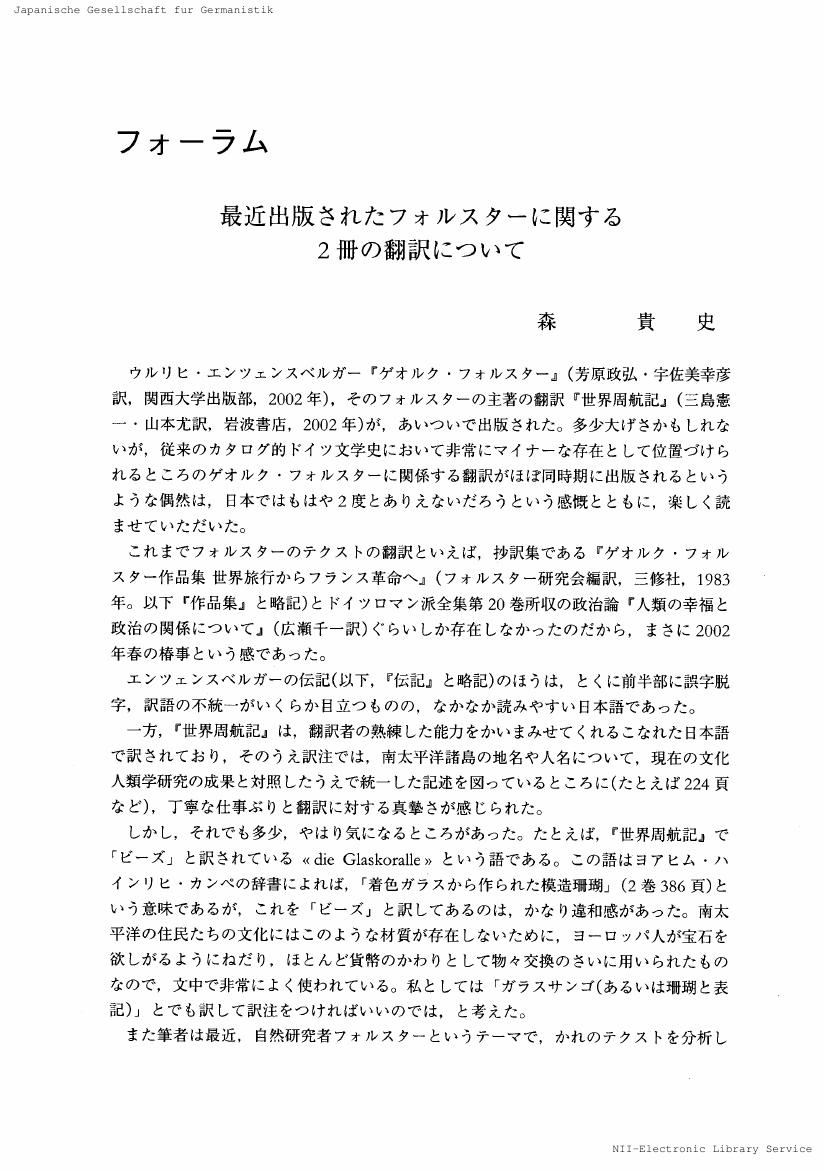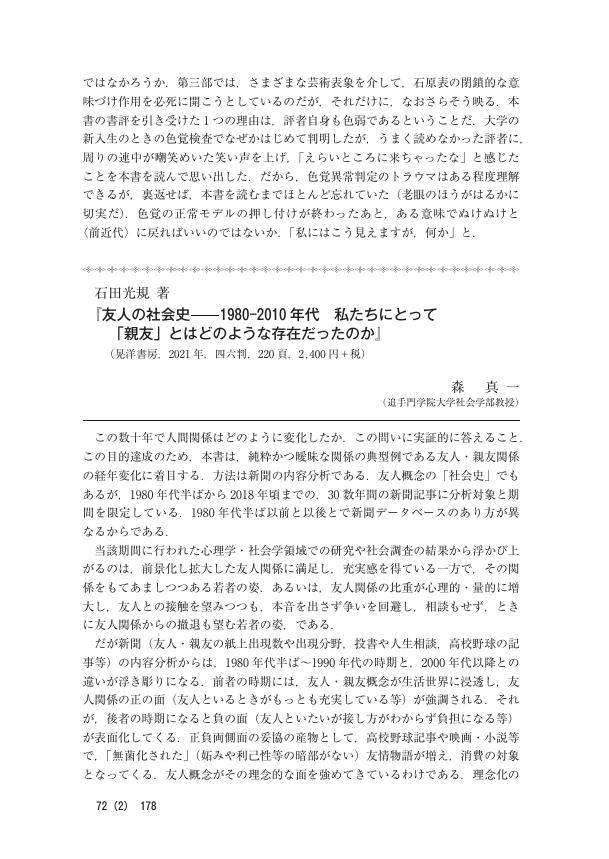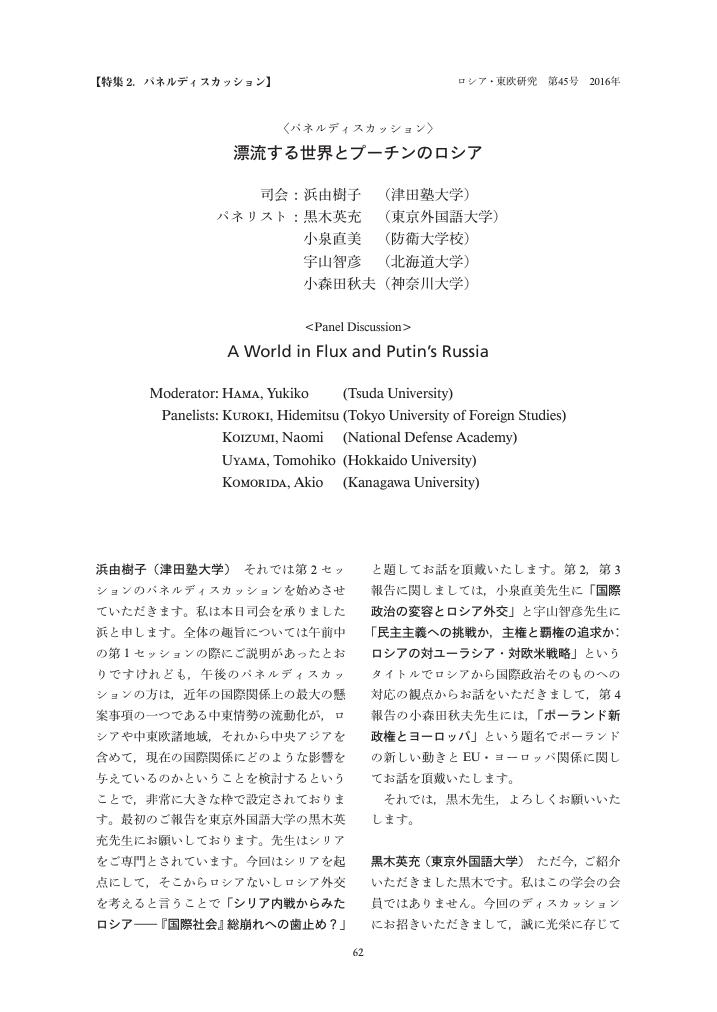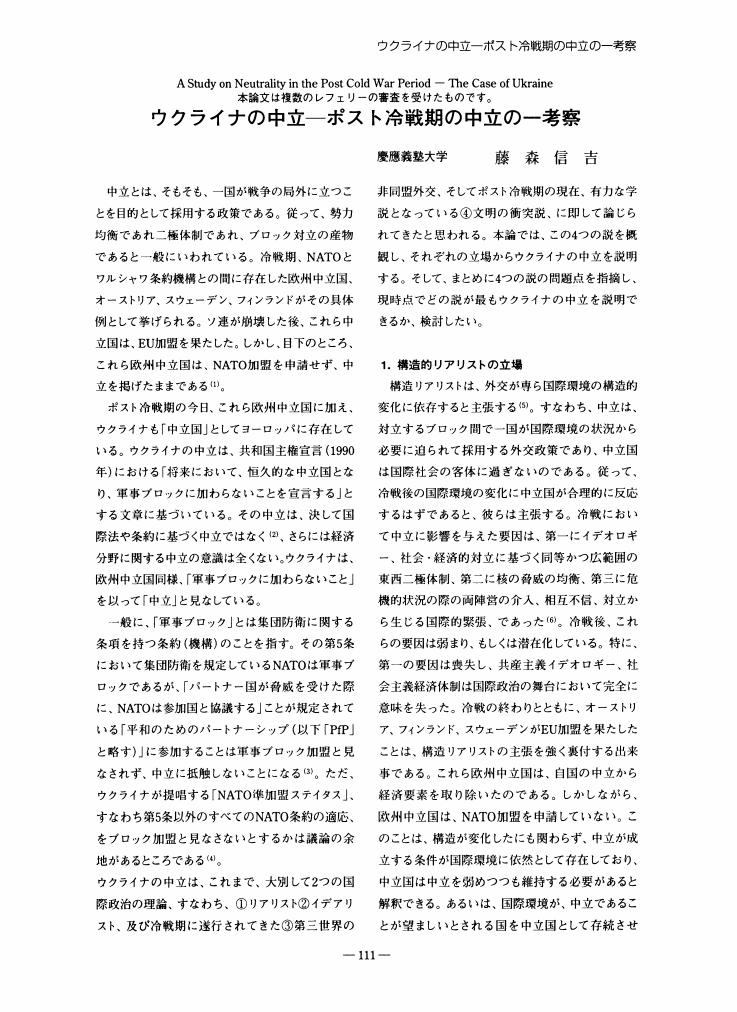1 0 0 0 OA 生命保險業の進むべき道(經營學の諸問題, 株式會社制度)
- 著者
- 森 莊三郎
- 出版者
- 日本経営学会
- 雑誌
- 經營學論集 2 (ISSN:24322237)
- 巻号頁・発行日
- pp.153-168, 1928-04-01 (Released:2017-08-01)
1 0 0 0 OA 最近出版されたフォルスターに関する2冊の翻訳について
- 著者
- 森 貴史
- 出版者
- 日本独文学会
- 雑誌
- Neue Beiträge zur Germanistik (ISSN:24330906)
- 巻号頁・発行日
- vol.110, pp.307-312, 2003 (Released:2018-03-31)
1 0 0 0 歌人稻森宗太郎
- 著者
- 稻森宗太郎[著]
- 出版者
- 稲森宗太郎を顕彰する会
- 巻号頁・発行日
- 1997
1 0 0 0 OA シェリングに於ける〈宗教と哲学〉 「無底」と「自由」の表現性
- 著者
- 森 哲郎
- 出版者
- 日本シェリング協会
- 雑誌
- シェリング年報 (ISSN:09194622)
- 巻号頁・発行日
- vol.25, pp.72-83, 2017 (Released:2019-08-06)
In this paper, by following the hint given in Heidegger’s noteworthy statement in his lectures on Schelling that “freedom is not a property of man, but man a property of freedom,” I first consider Schelling’s Notion of “Freedom” and “Unground.” Behind this new conception of freedom (i.e., as the capacity for language) lies that “peak” of Schelling’s treaties on freedom, namely, the “Un- ground,” a notion which now can be interpreted as the “Background of silence.” Behind the basic philosophical thesis of the text that “Willing is original Being,” the religious dimension of the “ineffability” of the Unground is hidden. By using the notion of a “non-dualistic difference between form and background” in our interpretation, we can understand anew the relation of the Unground to the distinction between existence(A) and ground(B). The Unground would be neither A(existence/form) nor B(the ground/background), but would be whole which transcends both A and B, that is, the hidden manifestation, the self-forgetting, non-abiding, all-present Background of silence which lies the fundamental openness of the possibility of human freedom (i.e. language). The Unground as Background, more than simply a matter of “undifferentiation” or an “abyss,” would be rather, as “pure affirmation,” “love,” or the “inner sky”(i.e. the soul), the open place of freedom as the essence of the expressional nature of a freedom embracing the world.
- 著者
- 森 真一
- 出版者
- 日本社会学会
- 雑誌
- 社会学評論 (ISSN:00215414)
- 巻号頁・発行日
- vol.72, no.2, pp.178-179, 2021 (Released:2022-09-30)
1 0 0 0 OA 洗浄液中におけるムクロジ果皮の汚染防止効果
- 著者
- 久保田 弥生 森山 恵美 前川 昌子
- 出版者
- 一般社団法人 日本家政学会
- 雑誌
- 日本家政学会誌 (ISSN:09135227)
- 巻号頁・発行日
- vol.57, no.10, pp.687-691, 2006 (Released:2007-10-12)
- 参考文献数
- 22
In order to clarify anti-deposition effects of mukuroji pericarps, deposition of carbon black onto cotton and polyester fabrics has been studied in aqueous solutions of mukuroji pericarps. The rates of deposition were evaluated from the reflectivity of stained fabrics. It was revealed that the rate of deposition of carbon black onto the fabrics in an aqueous solution of mukuroji pericarps was lower than that in an aqueous solution of sodium dodecyl sulfate as well as in polyvinyl alcohol, which is a known anti-redeposition agent. In addition, it was revealed that theses effects were not introduced by the saponin component alone, but by the whole mukuroji pericarp which contains the non-saponin component.
1 0 0 0 OA 中国年金制度の問題点 ―年金数理における年金財政の持続性の分析
- 著者
- 李 森
- 出版者
- 日本財政学会
- 雑誌
- 財政研究 (ISSN:24363421)
- 巻号頁・発行日
- vol.8, pp.199-215, 2012 (Released:2022-07-15)
- 参考文献数
- 27
年金制度の財政危機をどう乗り越えるか。これは年金制度を安定的に維持していくうえで欠かせない研究課題である。急速に進展する人口高齢化社会のもとで,将来の年金財政を維持するためには,年金制度の再検討と改革が必要となる。 本稿では,中国の各地域(省)別の年金財政の現状分析にあたって,年金制度のカバー率と省レベルの社会プール化の限界点および年金財政の持続可能性などの視点から,中国の現行年金制度の問題点を取り上げ,さらに現行制度の改革の必要性について議論する。
1 0 0 0 OA 月村太郎編著『解体後のユーゴスラヴィア』 (晃洋書房,2017年,304ページ)
- 著者
- 小森 宏美
- 出版者
- ロシア・東欧学会
- 雑誌
- ロシア・東欧研究 (ISSN:13486497)
- 巻号頁・発行日
- vol.2017, no.46, pp.121-125, 2017 (Released:2019-02-01)
1 0 0 0 OA 漂流する世界とプーチンのロシア
1 0 0 0 OA 二月革命期におけるブルツクスの土地改革論
- 著者
- 森岡 真史
- 出版者
- ロシア・東欧学会
- 雑誌
- ロシア・東欧研究 (ISSN:13486497)
- 巻号頁・発行日
- vol.2007, no.36, pp.159-172, 2007 (Released:2010-05-31)
Just after the February Revolution in 1917 Boris Brutzkus actively participated into the public debate over the agrarian reform. This paper shows how he conceived the task of reform under the newborn democratic government. Although his view on this problem is less known than his famous lecture on Marxist socialist economy in 1920, it deserves attention for its unique perspective placing the peasant farming as a vital element in capitalistic development of the Russian economy. His focus of criticism in this period was Russian Populists (Narodniki) who were at that time in the midst of popularity. He strongly warned that their agitation about the overall land distribution without compensation and redemption would not only lead sweeping economic catastrophe but also seriously endanger the fate of democracy.While Populists see the root of agrarian crisis in the land shortage among peasants, Brutzkus points out that the essence of the land shortage was accumulation of agrarian overpopulation caused by the extremely sluggish pace of Russian economic growth. Because of this, Russian industry could neither absorb the increase of rural population nor provide domestic market for agricultural products. In addition, on the side of villages the communal ownership of land held back the population flow into cities. Thus the solution of agrarian crisis needs also the development of industrial production. In his opinion such a development is possible only under capitalism. Therefore the land reform must be compatible with the general framework of capitalist economy. In this connection Brutzkus emphasizes the importance to preserve Stolypin's legislations with necessary democratic revisions. Referring to the experiences of Western countries, he advocates that the peasant's private ownership of land with the system of well-organized mortgage credit can promote intensification of peasant farming and flow of rural surplus population into cities. Since land is now one of precious assets of people, every peasant who receives land must bear responsibility to the national economy for its adequate utilization through the payment of rent corresponding to the prices of expropriated land. From these considerations Brutzkus urges intellectuals to tell people honestly that land cannot be distributed freely. He believes that the success of land reform depends on peasant's individual initiative and energy and for this end the immense energy of excited people must be transformed into creative force for economic construction.Brutzkus' standpoint was similar with those of Neo-populists (Neonarodniki) in its recognition of peasant farming's vitality and deep concern on the fate of national economy. However, Neo-populists still shared with traditional Populists negative attitude toward capitalism and the private land ownership. Most of Russian liberals were also sympathetic to the socialization of land in a moderate form. These circumstances placed Brutzkus in a quite isolated position. The Populist program was adopted by Bolsheviks and put into execution by communal peasants. In this point the October Revolution was the Populist agrarian revolution. Along with his critique of Marxist socialism, Brutzkus' penetrating criticism against Populism has great historical significance in its deep insight and civil bravery.
1 0 0 0 OA 初期ネップ下の提言にみるブルツクスの経済発展観
- 著者
- 森岡 真史
- 出版者
- ロシア・東欧学会
- 雑誌
- ロシア・東欧研究 (ISSN:13486497)
- 巻号頁・発行日
- vol.2003, no.32, pp.162-174, 2003 (Released:2010-05-31)
Boris Brutzkus is well-known for his pioneering and penetrating criticism against the Socialist economy. However, relatively less known is the fact that he defended the social role of government to protect the interest of the people. The purpose of this paper is to reconstruct and appreciate his vision of economic development underlying such a unique standpoint.For this purpose Brutzkus's following two important contributions will be investigated: i) his report “Economic Precondition for the Reconstruction of Agriculture” made at the All Russian Congress of Agronomists held in March 1922; ii) his paper “Agrarian Overpopulation and Agrarian Institution” published in the organ of the People's Commissariat of Agriculture in June/July 1922. Both of them include profound insight into the causes of catastrophic destruction of Russian agriculture after the October Revolution as well as several important policy proposals for its restoration.Brutzkus attributes the root cause of agrarian catastrophe to the “black redistribution” and emphasizes that it is not only the Soviet government but also all of the intellectuals and the people who must free themselves from the illusionary idea that the agrarian problem can be solved by nationwide land redistribution. Fully recognizing the limits of NEP as partial liberalization under the Communist dictatorship, he supports the basic direction of NEP for the reason that it serves the interest of Russian national economy.In his schema of national economy, the dynamic agro-industrial linkage, especially the smooth flow of labor from agriculture to urban industry constitutes one of the essential factors in the process of economic development. Coupled with slowness of industrialization, Russian land community hindered this flow of population and became the hotbed of agrarian overpopulation. Agrarian policies and agrarian institutions must be favorable for such a flow and at the same time soften the pain attendant on it. From this follows the necessity of guaranteeing peasants the right to dispose of their land freely. Owing to some fundamental differences between agriculture and industry, this right brings not the victory of agrarian capitalism but promotes the growth of peasant economies and their adaptation to the market environment.For Brutzkus, the national economy is a huge social framework giving its members economic and cultural wealth that they cannot produce alone. Flowering of individual freedom needs development of the national economy. The reason he affirms capitalism and rejects Marxian Socialism is that he firmly believes that the development of national economy in the industrialization era is possible only under capitalism and that individual freedom is inseparable from the private ownership of the means of production. However, as is shown in his argument of the relative advantage of peasant economy in agriculture, dominance of capitalism is neither exclusive nor unconditional even in the market. His vision of the desirable national economy can be characterized by it compositeness and variety created by the mixture both of capitalist institutions playing the leading part and of various kinds of non-capitalist institutions playing secondary but often essential roles.The above-described Brutzkus's vision is highly suggestive in its rare combination of economic logic and due attention to historical factors. Understanding of this vision will be of considerable help in an in-depth appraisal of his critical analysis on the Soviet economy.
1 0 0 0 OA ウクライナ議会と中間勢力―大統領との関連から
- 著者
- 藤森 信吉
- 出版者
- ロシア・東欧学会
- 雑誌
- ロシア・東欧研究 (ISSN:13486497)
- 巻号頁・発行日
- vol.2002, no.31, pp.164-180, 2002 (Released:2010-05-31)
- 参考文献数
- 24
This paper aims to analyze the development of parliamentary systems in Ukraine.Since independence, Ukraine held parliamentary elections three times (1994, 1998, 2002) .There are many articles which analyzed these elections. Their approaches were characterized by two. First of all, they were using the left-right ideology scale to analyze them. For instance, parliamentary camps would be classified by this scale. The Communist party of Ukraine was located on the left edge, on the other hand Ukraine nationalists parties were located on the opposite side. Secondly, the political party was their central analysis unit in these studies.However, these approaches have two problems. First, ideology issues are not the central matter of current political arena. It is insignificant to use this scale to classify today's the political parties. Second, political parties are less important actors during the elections and the session of the parliament. As for elections, independent candidates and the electoral blocks are dominant. Also, parliamentary procedures are ran by the fractions, which are the compositions of independents, parties and blocks. There is little coincidence between the three. This is especially for independents who are less ideologized and frequently change their belongings. Once those deputies form their own parties or fractions, few of them are alive by the time of the next elections. Third, these less ideologized deputies, called “Centrist, ” become more important within the current political arena. We should consider these forces as a main unit of our research.The Centrists begin their career as a high rank bureaucrat or directors of large state industries. Since each of them individually retained certain political resources, they did not form any organization such as political party. The rise of the Super-Presidentilaism and the large scale economic reform as well as the introduction of proportional representation, all had an impact on these Centrists. New counter-elites emerged from the privatization and diversification of economic interests, confront old elites. This drove old and new elites to organize each political structure to compete against each other. Also, they had a interest to support the president not to revive old communist regime.Last year's elections proved the above mentioned tendency. The ideologized parties lost their momentum. On the other hand, the Centrists' parties gained more seats than the previous elections. Furthermore, we observed that the Centrists' split into pro and anti presidential camps within the parliament. This will be the strong evidence of how Ukrainian parliament works well.
1 0 0 0 OA ブレジネフ時代の外交政策
- 著者
- 森本 良男
- 出版者
- THE JAPANESE ASSOCIATION FOR RUSSIAN AND EAST EUROPEAN STUDIES
- 雑誌
- ソ連・東欧学会年報 (ISSN:03867226)
- 巻号頁・発行日
- vol.1980, no.9, pp.2-15, 1980 (Released:2010-03-16)
- 被引用文献数
- 1 1
1 0 0 0 OA ガス・パイプラインからみたウクライナ・ロシア関係―相互依存か従属か―
- 著者
- 藤森 信吉
- 出版者
- ロシア・東欧学会
- 雑誌
- ロシア・東欧学会年報 (ISSN:21854645)
- 巻号頁・発行日
- vol.2000, no.29, pp.105-113, 2000 (Released:2010-05-31)
- 参考文献数
- 32
Since independence, Ukraine has heavily relied on Russian gas. Many argue that Ukraine's energy dependency will affect Ukraine's security policy and will lead Ukraine to Russian satellite state (so-called “Second Belarus”) . They describe Ukraine-Russian relation as zero-sum games: Russia is an aggressive imperialistic state and Ukraine has less chance to counter this measure. However, many ignore that Russia also depends on Ukraine's gas pipeline. Without Ukraine, Russia cannot export her energy to European market. It seems that both countries have vulnerability to each other. In this paper, the possibility of interdependency between Ukraine and Russia will be discussed.Gazprom, the Russian gas giant, monopolizes the gas supply to Ukraine. Therefore, Ukraine has tried diversifying energy resources. Besides that, Ukraine has huge gas debts and its sum increases every moment. Gazprom demands to compensate for Ukraine's debts with Ukrainian strategic company's share such as gas pipeline systems. On the other hand, Russia also has vulnerability to Ukraine. 90% of Russian exported gas goes through Ukrainian territory. Ukraine controls tariff and sometimes illegally siphons off of Russian gas transiting Ukrainian territory. Therefore, Russia had no way but to agree with the debt-restructuring plan, which gave advantage to Ukraine.Both countries try to decrease their own vulnerabilities. Ukraine seeks alternative energy suppliers. Recently, Ukraine is building a pipeline to import Caspian oil. Due to financial problems, this route is so far incomplete. As for importing Turkmenistan gas, Ukraine has to pay transit fee to Russia. It is obvious that Turkmenistan gas does not contribute to decrease dependency on Russia. Russia also plans to build alternative gas pipelines, which bypass Ukraine. But these routes will not run for the next 10-15 years due to financial and technical problems.As discussed above, both countries are not successful seeking alternatives. For them, the most mutual benefited plan is further using existing pipeline. Then Ukraine could receive the transit fee, Russia saves huge investment capital (or save expensive transit fee for using the newly constructed pipeline) . However, the following problems must be resolved. First, Ukraine has to show her plan to clear huge gas debts. Under recent financial constraints, Ukraine has limited ways to clear debts such as cash emission, asking Russia to reconstruct debts, and selling (or leasing) pipeline systems. Second, Ukraine has to resolve “illegal siphon off”. Russia should ask Ukraine's guarantee or control the rights of pipeline. Under these circumstances, most controversial plan is selling the share of pipeline (wholly or partially) . Its merits are following: clear Ukraine's gas debts, attract Russian capital to renovate pipeline systems, and further transit Russian gas. However, there is a large opinion that joining Russian capital to Ukrainian energy sector should be dangerous to Ukraine's national security. They fear that Ukraine might completely lose the playing card. Since Western investors hesitate to invest in Ukraine, Russian capital is the only investor. Whether Russian or Westerner, the good investor for Ukraine is one who invests well in Ukraine. The worst scenario is that both sides increase suspicion to each other, Russia concentrates building up her alternative pipeline projects and abandons transiting through Ukrainian route. If both sides understand well their mutual benefits, then there should be interdependency between the two countries.
1 0 0 0 OA コムソモールの組織の遠心化と機能転換: 1987年―1988年
- 著者
- 森 美矢子
- 出版者
- ロシア・東欧学会
- 雑誌
- ロシア・東欧学会年報 (ISSN:21854645)
- 巻号頁・発行日
- vol.1999, no.28, pp.145-154, 1999 (Released:2010-05-31)
- 参考文献数
- 31
1 0 0 0 OA ウクライナの中立―ポスト冷戦期の中立―考察
- 著者
- 藤森 信吉
- 出版者
- ロシア・東欧学会
- 雑誌
- ロシア・東欧学会年報 (ISSN:21854645)
- 巻号頁・発行日
- vol.1998, no.27, pp.111-119, 1998 (Released:2010-05-31)
- 参考文献数
- 27
1 0 0 0 OA バルカン半島南西部の民族問題と地域統合 ―アルバニア人問題を中心に―
- 著者
- 金森 俊樹
- 出版者
- ロシア・東欧学会
- 雑誌
- ロシア・東欧学会年報 (ISSN:21854645)
- 巻号頁・発行日
- vol.1996, no.25, pp.91-98, 1996 (Released:2010-05-31)
- 参考文献数
- 27
1 0 0 0 OA ロシアにおける体制転換の論理と過程
- 著者
- 森下 敏男
- 出版者
- ロシア・東欧学会
- 雑誌
- ロシア・東欧学会年報 (ISSN:21854645)
- 巻号頁・発行日
- vol.1995, no.24, pp.10-20, 1995 (Released:2010-05-31)
- 参考文献数
- 7










